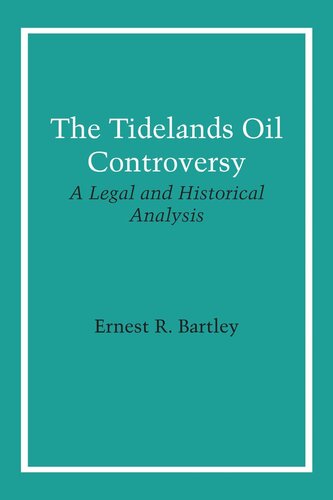

Most ebook files are in PDF format, so you can easily read them using various software such as Foxit Reader or directly on the Google Chrome browser.
Some ebook files are released by publishers in other formats such as .awz, .mobi, .epub, .fb2, etc. You may need to install specific software to read these formats on mobile/PC, such as Calibre.
Please read the tutorial at this link: https://ebookbell.com/faq
We offer FREE conversion to the popular formats you request; however, this may take some time. Therefore, right after payment, please email us, and we will try to provide the service as quickly as possible.
For some exceptional file formats or broken links (if any), please refrain from opening any disputes. Instead, email us first, and we will try to assist within a maximum of 6 hours.
EbookBell Team

4.7
46 reviewsThis study is not written from the narrow perspective of “Who gets the oil?” It is a thoughtful probing of an issue—the ownership and control of the submerged soils of the marginal sea—the outcome of which may go far to determine the division of powers between states and nation under the American federal system. American constitutional law, international law, theory of federalism, American politics, the machinations of pressure groups, use of propaganda techniques, and issues of social and economic policy—all these features of American government and many more are inherent in the controversy. In 1947, in a precedent-making decision, the Supreme Court enunciated the principle that the federal government, not the states, has “paramount rights in and power over” the marginal seas which border the coastal states, and has “full dominion over the resources under that water area, including oil.” For more than 150 years the littoral states had exercised uncontested jurisdiction and ownership over the marginal-sea area, subject only to the powers specifically granted to the national government by the Constitution. The states had regulated the fisheries within the three-mile limit, applying state laws to vessels licensed under federal statutes. Long before oil possibilities were thought of, they had granted or leased areas in the marginal seas to private persons and corporations for purposes of land reclamation and harbor development, dredging for sand and gravel, development of oyster beds, and similar projects. These property rights can far exceed in value the wealth to be derived from petroleum. A just settlement of the issue, says the author, calls for restoration to the states of control of the marginal sea out to their historical boundaries—three miles in most cases; three leagues, or ten and one-half miles, in the case of Texas and the west coast of Florida. This study is based upon thorough investigation of all literature on the subject and personal interviews and correspondence with leaders on both sides of the controversy.